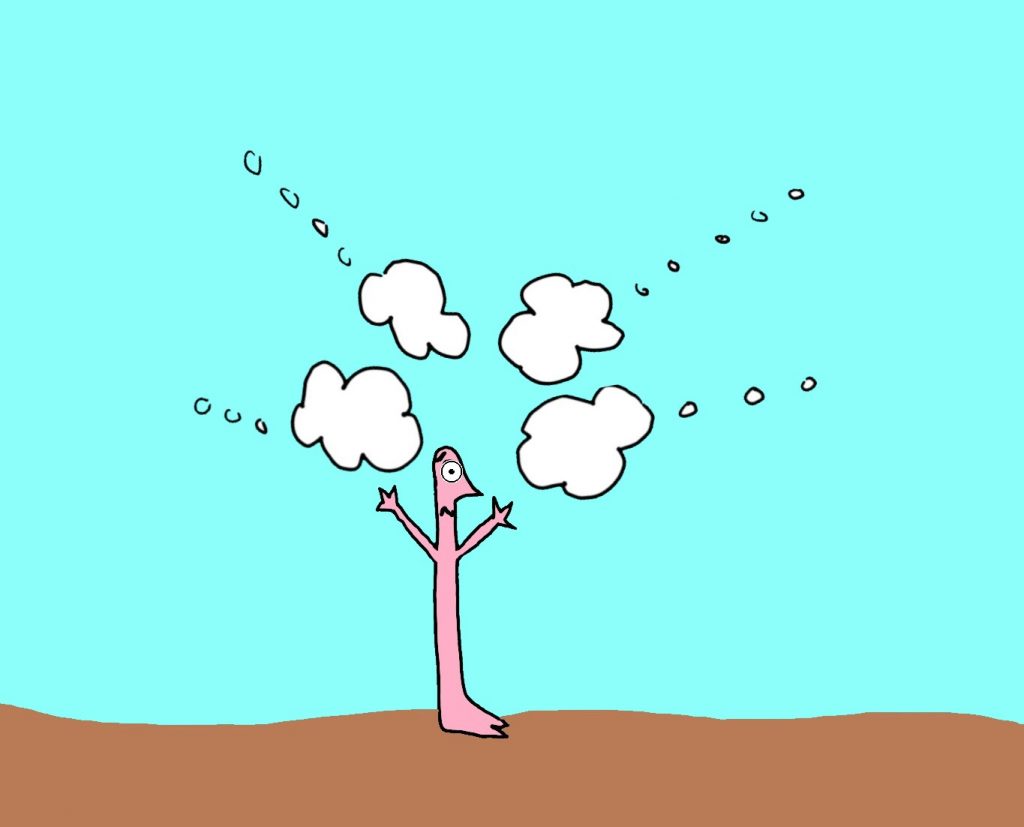Most of us were raised to care about how we’re perceived by others. To some extent, this is normal and healthy! Yet, when you become super sensitive to how other people perceive you, this can really hold you back!
This landed in my inbox the other day:
“I have a question for you. Do you also find that being an HSP, you are also very sensitive to how others perceive you?
As an HSP, I’m finding that part the most difficult to control. I’ve wondered if I’m this concerned about perceptions because of my upbringing, having grown up in a family that’s very concerned with appearing a certain way. Or, if that is in fact a byproduct of being HSP?
I find it hard to control this one part of my life. Picking up on small cues of what someone might think about me at any given moment, then becoming hurt by that and then isolating myself from certain people.
I also find that I have a tendency to pick up on a lot more negative things than positive.”

That’s a great question! I certainly used to!
Many of us are raised to care (too much) about how others perceive us. The only problem is, most of what other people perceive, has very little to do with you, me or whatever they are looking at.
Here’s a very simple example: if someone hates blue, they’ll hate your blue sweater too. It doesn’t mean the sweater is ugly or that it doesn’t suit you. Similarly, if someone is angry because of something unrelated to you, then chances are still pretty high that they’ll snap at you more than they otherwise would.
It’s all pretty easy to see and understand from a distance. Yet, when we’re in a one-on-one situation with someone (even if it’s only a brief moment of passing each other on the street) then most of us are wired to assume that there is some kind of cause-effect relationship between “what I do” and “what they do”.
If someone smirks, we wonder whether our clothes are funny somehow. We usually don’t think: “ah, that person must have been thinking of something completely unrelated to me and smirking because of that”.
In other words, as people, we have a tendency to take things personally – at least a little! This is a normal, human tendency.
Being super sensitive to how others perceive you can be a learned response
If you were raised in a family where “looking good” was really important, then you will have learned to become super sensitive to how other people perceive you. You will have learned to amplify and focus on that tendency to notice what others (seem to) think, and take those things personally, for two reasons:
- In a family where image is everything. Your parents judge you by how you “make them look” to the outside world. Everyone’s perceptions thus become your “responsibility”.
- A family heavily focused on image tends to have at least one narcissistic parent. A narcissistic parent will not take responsibility for their feelings or actions. Everything that goes wrong is someone else’s “fault”. That means a narcissistic parent will blame you a lot. You learn that everything is your fault: if they are affected by what you do in a certain way, then that is your fault. How they feel, is your fault. As a result, you learn to worry about what they feel and think, way more than is reasonable or healthy.
When you are raised by one or two narcissistic parents, you learn how to “do life” from them. You learn to follow their cue on how to distort reality to fit in with the family tribe. But these distortions get you in trouble.
Thankfully, while being super sensitive to how other people perceive you is something you can learn, it’s also something you can unlearn. Many of my clients are kind-hearted people who grew up in a family with at least one narcissistic parent (I grew up that way too!). As a result, you were taught to prioritise and worry about what others think, far too much! So, let’s take this apart so you can start shifting it!

Is this just an HSP issue?
This really isn’t just an HSP issue.
I used to think that perhaps being super sensitive to how other people perceive you was just an HSP issue, until I slowly stopped taking everything so personally and then noticed that loads of people around me (HSP or not) made the same mistaken assumption: that what they saw in others was about them somehow.
I also noticed that when I was having a bad day, and not hiding it (nor taking it out on anyone either!) random people would act defensively out of the blue, assuming that I was unhappy about something they did or didn’t do.
It was really weird actually! I remember ordering something at a restaurant, and the lady serving me jumped to the conclusion that I was unhappy about the service, simply because I was grumpy (note, I didn’t snap at her nor complain!)
Reversely, I know people who expect that when they “show grumpiness” (without any indication of what they are grumpy about) the other person “should” understand that it’s a reflection on them. I certainly used to think this way too once.

There’s more to it than just you
When you are super sensitive to how other people perceive you, you tend to forget about the other person’s circumstances. The thing is, when you are interacting with someone, there are very many things influencing the other person’s perceptions and reactions.:
1. There are a multitude of things beyond your awareness that they may be thinking about right now.
E.g. someone might act impatient with you because:
- they need to visit a relative in the hospital, are running late, and are nervous about the relative’s operation
- they may have indigestion
- they may be unhappy about their financial situation, etc
2. People have moods.
Those moods are not exactly chosen. Mostly, they just kind of happen.
It’s not fair to equate moods with conscious, chosen reactions.
3. People are biased.
We all have preferences.
We all have very personal likes and dislikes.
These have little to do with other people.
Yet, when other people display one of our dislikes, we’ll usually have a strong reaction.
For example, I am not a big fan of cars. I get carsick easily, and I much prefer traveling by bike or train.
This leads to all kinds of complicated misconceptions when it comes to someone who offers to pick me up by car. I usually refuse and it can be difficult to explain things in a way that the other person doesn’t take personally.
They might think that I don’t like them, or don’t like their car, or that I don’t want to be honest with them. For many people it’s pretty much impossible to imagine that anyone could simply not like cars- no more, no less!
Hence, depending on what is normal in your universe, you might draw the wrong conclusion about why someone responds a certain way too and vice versa.
(e.g. I used to assume that if someone made a detour by car, that it was always, necessarily for some practical, errand reason. Yet, lo and behold, I started to realise that there are real flesh and blood people who actually enjoy driving around in a car in and of itself. For me that is (still! :) ) really hard to imagine and hence, I’ve made a lot of mistaken assumptions about other people, their car travel and what it all was about.)
It’s out of your hands, mostly
Most of our conclusions are a mix of conscious and unconscious motivations, preferences, experiences and knowledge. Someone might either like or dislike you for as little as that you remind them of their aunt Trudy. Then, when they get to know you better, they change their mind, or they might even jump to a different quite random association.
Hence, you might rightly feel sensitive to how other people perceive you at times because they have a strong reaction to you. But that doesn’t mean that reaction will stick, or that it is important!
When it comes to being HSP, one of the key things we tend to get judged for by others is our sensitivity. Yet, someone who e.g. is loud and takes a lot of risk, will tend to be judged by others for that too. Everyone on the planet will have something which sets them apart and for which other people will judge them.
Instead of taking it as a blow to the head, it’s possible to reframe a negative judgement as: “Thank you for noticing one of my inherent qualities. The fact that you don’t appreciate that quality very much is hereby noted.” And leave it at that.
How important are other people’s judgements really?
Without conscious correction, most of us have a lot of faulty thinking processes going on all the time. We judge and assume and associate constantly. The conclusions of all that will show in our body language and behaviour. Yet many of these processes are lighting quick and instantly forgotten too.
That lady walking down the street with the ugly glasses… would you be remembering that as little as an hour later?
Perhaps, but probably not.
Would you want her to do something about those glasses?
Perhaps, for a split-second. Yet, would you honestly want her to take your judgement to heart?
So, in reverse too, other people will have a lot of judgements about you, and pretty much forget about them right away or not consider them truly noteworthy. (There are of course the toxic kind of people who love to endlessly point out all that is wrong with everyone, and expect all those people to change in order to suit them. Obviously, those people are worth ignoring completely).
When you feel super sensitive to how other people perceive you – remember that many other people feel the same way. And all that collective worry about “who sees who and thinks what” is not helping anyone. Plus, in the bigger scheme of things, it really isn’t that important.
Is it worse for HSPs?
For us HSPs the combination of caring a lot about what other people think paired with our sensitivity is quite a strong punch. It’s one thing to care about perception when you’re not too aware of other people’s reactions. Yet as HSPs we can be hyper aware to what is going on around us.
If we pair that awareness with the assumption that it’s important to keep track of what other people think about us, then we’re setting ourselves up for massive overwhelm.
So while many people worry too much about what others think of them, as a Highly Sensitive Person you have a “talent” for being sensitive to how other people perceive you at much greater heights! (or depths, of despair). Since we notice so much more as HSPs, we can also “supercharge” our perception of others, to the point where it can be crazy making. Hence, it’s really important to keep this tendency in check!
What’s more, on top of keeping track of other people’s reactions, it then seems only “logical” to start to try and manage the impression we (think we) are creating with others.

The only problem is, with so many different people judging you, you’ll need to keep up a constantly changing act: what makes a good impression on one person, does not necessarily please someone else. And as pointed out above, the whole process is rather unpredictable and uncontrollable anyway.
So in a long and winding way I can say, yes, being concerned about what others think does tend to be an HSP “thing”, but definitely not a trait. In other words, you have the natural ability to notice people’s responses more strongly than most other people do, but this does not mean that you MUST take all those things personally.
Taking people’s responses to heart is not a fixed part of your internal make-up. The taking things personally part is just our conditioning at play, and we can learn to stop taking it all so seriously. You can actually give other people permission to have their own random and crazy opinions, even if it’s about you.
Don’t go overboard with your perception skills
The thing to remember is that just because you notice more about what is going on with someone else, doesn’t mean that you have all the facts.
- Mistake number one is to assume that the other person’s reaction is completely and necessarily about you. (Making everything that everyone else does about you too often, is a slipperly slope towards narcissism)
- Mistake number two is to assume that you have all the facts needed to put the other person’s reaction into the right context.
It’s easy to overestimate our own ability to know exactly what is going on with someone else, and it’s also easy to slip into an expectation that “words shouldn’t be necessary”.
Yet, life gets a lot easier when you keep an open mind about what someone may mean. Not feeling pressured to react unless someone addresses you directly, brings a lot of ease into your life.
It’s also not your job to figure out what someone may mean if they are being vaguely critical.
In other words, if someone frowns at you when you’re reaching for the last cookie…well, that could be for a whole host of reasons. If it’s important to them that you don’t eat that cookie, then they better tell you directly. Otherwise, how on earth were you to know that they weren’t just trying to hold back a sneeze or thinking about something depressing?
(And yes, of course it is good manners to ask: “Does anyone else want the last cookie? I’m happy to share!” Snatching something off a plate before anyone has had a chance to speak up is obviously the other extreme. Although, if others have been stuffing their face all day without asking you if you wanted some, go ahead and snatch that cookie.)
In a way, being sensitive to how other people perceive you can be a complex process for checking if you have permission. If your parents expected you to “just know” how to behave, without actually telling you, you will have learned to pay close attention to their body language for any clues. So, if you’re not sure you’re allowed to take the last cookie, you may reach for it but be hyper aware of everyone’s reactions too. You learned that it’s your job to mind-read to the best of your ability. How exhausting!
How do you make it stop?
When you are hyper sensitive to how other people perceive you, you might be worried what they think because:
- you learned that you MUST make a good impression at all costs
- you’re not sure what is o.k. and are trying to mind-read if you have permission
- you learned to value what others think, over what you think yourself
When we are already criticising ourselves internally, then any suspected similar judgement from someone else will derail us. This is not because the other person has so much power over us, rather, it’s because deep inside we’ve already decided that we are – indeed – “too X, not enough Z and wildly inappropriately Y”. When you are internally criticising yourself, this will make you more sensitive to how other people perceive you!
In the end, all those fingers from other people, pointing (or seemingly pointing) at something about you, all fall away, and the only thing of substance is your own finger and the way you point at yourself for something.
Other people are allowed to have their challenging views and their outrageous opinions. We are however by no means required to assume that we need to do anything about it nor do we need to take it to heart. That is a decision we can make.
There are just too many people out there potentially having some kind of opinion about something concerning us in some direct or indirect way. We can’t process it all, we can’t figure it all out, and we don’t need to.
This is another one of those “easier said than done” issues! Sometimes it may be easy to let go of criticism. Yet, when that judgement was already deeply rooted inside of us, we can continue to feel hurt for days. No matter how hard you try to let go, you just can’t get the negativity to budge! For those cases, it’s really helpful to know how to do deeper healing work on the issue. I teach this in the No to Narcissists Programme for Highly Sensitive People, here.
So why DO we take things personally?
Apart from the old “keeping up with the Joneses” and a general social-animal desire to predict how other people will behave, there can also be specific, deeper reasons why we might pay special attention to other people’s reactions.
If you grew up in a family where you felt unsafe somehow: whether physically unsafe, or emotionally unsafe to be yourself, then you will have learned to do your best to create the best possible impression on those around you:
- You learned that in order to be safe/ appreciated/ supported you had to take on a certain role.
- You couldn’t just be yourself, because that didn’t fit the role.
- Being what other people wanted you to be, became more important than being yourself. Your role was about what others wanted from you.
- Knowing what other people wanted from you became more important than knowing what you wanted. What you wanted only got in the way of playing your role.
- What other people thought of you became more important than what you thought of yourself. You aimed to get their protection, appreciation and support, even if this undermined your true self.
It’s possible to keep living this way forever, but at what cost? Taking your power back, by taking steps to stop caring about other people’s opinions, can feel threatening. However, that’s only because the little child part inside that feels threatened doesn’t necessarily realize that “things have changed”.
When you’re a little kid, you don’t have the kind of options that you have as an adult. When something painful in childhood seems to be an ‘unavoidable truth’, then that “truth” tends to get written into our internal software, and those old inner responses will keep running long after our outer circumstances have significantly changed. It’s only when we realize that we actually have new choices now, that the inner hold that such conditioning has over us can start to loosen. (For more help with that loosening, take a look at my No to Narcissists Programme for Highly Sensitive People)
Action Steps
So next time you are worried about what someone else thinks about you:
1. Do a fact check.
What EXACTLY did you notice? (Facts only! No interpretations of what those facts mean!)
2. Do a scenario brainstorm.
Hypothetically, what are some out-of-the-box reasons why this person might have reacted this way?
Be sure to include scenarios that have nothing to do with you!
3. If you’re convinced that it IS about you, then spell out the judgement.
Then turn it around; are you judging yourself this way too?
If so, what could you do about that? (Your judgement, not the other person’s!).
Did someone from your past judge you in this way too? If so, then that is probably where the deepest pain is.
4. Give yourself permission to have this judgement.
Give the other person permission (in your head) to have this judgment.
Give yourself permission to have a reaction to this judgement.
Yep, this is the grown-up world. It’s full of people judging people. That’s just how it is. No worries. You’re just a part of that big noisy flow.
5. Is this a judgement about who you are? Or is it a judgement about something you do?
You can change what you do, but you can’t change who you are.
Getting these two straight is very important.
No matter how much you may feel judged for who you are, it’s not your job to change who you are! Really, it’s out of your hands.
What you can do is do something about the way you consciously respond to things. Yet, it’s up to you to decide whether you think something is worth changing at this point.
Utopia
It would be nice if everyone in our life was in full support of everyone else, wouldn’t it? Yet, that would also mean that we would need to be in full support of the criminal in our neighbourhood, the people who annoy us, and all the things that we really dislike in others. In other words: a pretty impossible scenario.
The thing is, simply by being a unique individual, we are all bound to piss someone off. There will be at least one person in your environment who opposes everything you most love and stand for. Chances are, you won’t like that person much either. And that’s o.k. It’s o.k. to judge that person (how could you not?). It’s also o.k. that your judgments don’t keep that other person up at night, right?
At times, you may be sensitive to how other people perceive you, and they will be sensitive to how you perceive them too.

Hey, I know this is easy to say, but not so easy at all to practice! As HSPs we tend to struggle a lot with situations that feel tense, where not everyone gets along and where we can anticipate conflict (“omg, this is going to go wrooooong!”) You try to smoothe things over, but sometimes nothing you do is helping! And all that peace keeping gets exhausting! Which is why I taught a detailed class with very specific techniques for dealing with tension for HSPs. You can find Tension Tactics Class in the Library, here.
A note on empaths
If you are an empath, then what you may be affected by most is probably not so much how you are perceived per se, or even the words people say at you, but rather other people’s energies, emotions and projections that “stick” to you. You can read more about being an empath here.
Final note
We live in a world filled with disagreement. Some of the disagreement is constructive, some of it is just painful but, either way, we live in a world of diversity. This means that it is impossible to make or do anything in such a way that everyone likes it.
Similarly, it’s impossible to be liked and thought well of by everyone simply for who you are. If you live in a secluded three-person village, maybe. If you are a toddler trying to please your parents, sure, there may be a particular tried-and-true formula that works. But once we are “let loose” into the great wide world, we are constantly up against people who agree and disagree with who we are and what we do in infinitely changing ways. The only way to move through that effectively is by anchoring ourselves in who we really are, and stay there.
Super quick rule of thumb. I mentioned narcissism before and I know many HPSs are quick to wonder “eeek, what if I am a narcissist??” – well, here goes:
Narcissistic people – the hopeless, never-will-change ones, truly believe that it is possible to be so “perfect” that everyone cannot help but love and admire and adore them. The really loud and overt ones constantly convince themselves that this is already the case (“People who don’t seem to like me are just jealous of me! Aka they secretly adore me!”) . And the covert types are less convinced that they are already winning, but still convinced that they could win everyone over once they nail the perfect life formula (to get there, they believe that beating themselves up for not being perfect yet is THE success strategy)
So quick inner check: does that sound A) appealing and/or logical, or B) absolutely ridiculous?
To stop being super sensitive to how other people perceive you, you need to focus less on what everyone else (seems to) think and more on your own insides.
This requires that for every judgement that derails you, for every criticism that upsets you, you consciously bring yourself back to: what do I think about this? What do I want here? What is important from my perspective, regardless of what anyone else thinks?
You don’t need to ignore everyone around you. Yet, you do need to put other people in the right context. They are not the expert on your life, you are. Hence, in the end:
P.S. Getting really grounded in your own body, staying true to your real self, and worrying less about wht everyone else is and isn’t doing, and is and isn’t thinking, isn’t easy. It takes practice. You get better at it the more you practice it.
Feeling stuck, confused or overwhelmed? Not sure where to go from here or what steps would help? Set up a Clarity Call with me here so we can figure things out in person.





















{ 1 comment… read it below or add one }
Hi,
Just wanted to thank you for these great (and healing) insights.
The article found me at the right moment: for two days I have been agonizing because I thought a legitimate question I had asked CEO during a business meeting, will get me seen as incompetent and stupid.
After reading this article I realized: well, to me it was a legitimate question, might be it wasn’t seen as in the best interest of a ‘ good corporate citizen’ but I really appreciate being true to me instead of fitting in at any price. Thanks!